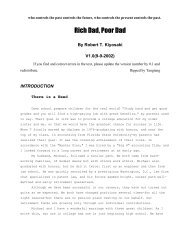Rich Dad, Poor Dad
Create successful ePaper yourself
Turn your PDF publications into a flip-book with our unique Google optimized e-Paper software.
who controls the past controls the future, who controls the present controls the past.<br />
police officers, artists, writers and so on. These professional skills allow<br />
them to enter the workforce and work for money.<br />
There is a big difference between your profession and your business. Often<br />
I ask people, "What is your business?" And they will say, "Oh I'm a banker."<br />
Then I ask them if they own the bank? And they usually respond. "No, I work<br />
there."<br />
In that instance, they have confused their profession with their business.<br />
Their profession may be a banker, but they still need their own business. Ray<br />
Kroc was clear on the difference between his profession and his business. His<br />
profession was always the same. Me was a salesman. At one time he sold mixers<br />
for milkshakes, and soon thereafter he was selling hamburger franchises- But<br />
while his profession was selling hamburger franchises, his business was the<br />
accumulation of income-producing real estate.<br />
A problem with school is that you often become what you study. So if you<br />
study, say, cooking, you become a chef. If you study the law, you become an<br />
attorney, and a study of auto mechanics makes you a mechanic. The mistake in<br />
becoming what you study is that too many people forget to mind their own<br />
business. They spend their lives minding someone else's business and making that<br />
person rich.<br />
To become financially secure, a person needs to mind their own business.<br />
Your business revolves around your asset column, as opposed to your income<br />
column. As stated earlier, the No. 1 rule is to know the difference between an<br />
asset and a liability, and to buy assets. The rich focus on their asset columns<br />
while everyone else focuses on their income statements.<br />
That is why we hear so often: "I need a raise." "If only I had a<br />
promotion." "I am going to go back to school to get more training so I can get<br />
a better job." "I am going to work overtime." "Maybe I can get a second job."<br />
"I'm quitting in two weeks. I found a job that pays more."<br />
In some circles, these are sensible ideas. Yet, if you listen to Ray Kroc,<br />
you are still not minding your own business. These ideas all still focus on the<br />
income column and will only help a person become more financially secure if the<br />
additional money is used to purchase income-generating assets.<br />
The primary reason the majority of the poor and middle class are fiscally<br />
conservative-which means. "I can't afford to take risks"-is that they have no<br />
financial foundation. They have to cling to their jobs. They have to play it<br />
safe.<br />
When downsizing became the "in" thing lo do, millions of workers |<br />
found out their largest so-called asset, their home, was eating them alive, j




